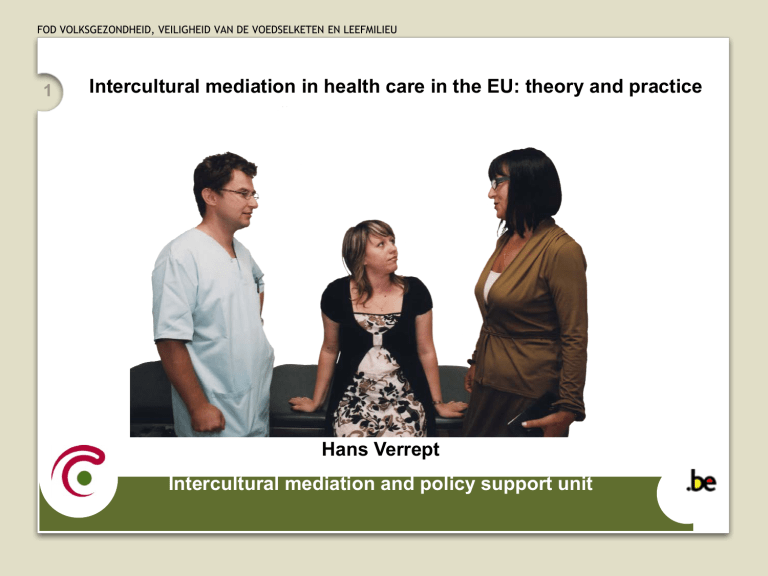
FOD VOLKSGEZONDHEID, VEILIGHEID VAN DE VOEDSELKETEN EN LEEFMILIEU
1
Intercultural mediation in health care in the EU: theory and practice
Hans Verrept
Intercultural mediation and policy support unit
FOD VOLKSGEZONDHEID, VEILIGHEID VAN DE VOEDSELKETEN EN LEEFMILIEU
2
1. Policy
- Migrants & Ethnic Minorities Issues of access + Quality of care
(Ethnic health care disaparities, Smedby et al. 2003)
- No monitoring of ethnic health care disparities
- No needs assessment for the domains of medical interpreting /
intercultural mediation in health care
- Many ‘projects’, ‘programs’
FOD VOLKSGEZONDHEID, VEILIGHEID VAN DE VOEDSELKETEN EN LEEFMILIEU
3
- Medical interpreters and intercultural mediators are not properly
trained
- Linguistic needs are often not met
FOD VOLKSGEZONDHEID, VEILIGHEID VAN DE VOEDSELKETEN EN LEEFMILIEU
4
N° of encounters with N° of encounters
the healht care system where a language
of MEM
needs to be resolved
3.727.500
N° of interventions by
interpreters/intercultu
ral mediators
1.863.750
(Based upon Van Gucht & Hertog, 2003; Verrept, 2012)
112.372
FOD VOLKSGEZONDHEID, VEILIGHEID VAN DE VOEDSELKETEN EN LEEFMILIEU
5
2. Why might we need medical
interpreting/intercultural mediation
- Linguistic barriers
- Socio-cultural barriers
- Ethnic barriers
- Lack of culture competence
Whose responsiblity is it to resolve these barriers?
FOD VOLKSGEZONDHEID, VEILIGHEID VAN DE VOEDSELKETEN EN LEEFMILIEU
6
Views on the roles of medical
interpreters/intercultural mediators
Language-oriented
Translation machine / invisible interpreter
Medical interpreter (NCIHC/IMIA/CHIA)
Intercultural mediator
Co-therapist
Therapy-oriented
FOD VOLKSGEZONDHEID, VEILIGHEID VAN DE VOEDSELKETEN EN LEEFMILIEU
7
What is intercultural mediation?
‘Bridging of the linguistic and cultural gap in communication and
faciltiation of the therapeutic relationship between health
professionals and service users’ (Qureshi, 2011)
‘to accompany relationships between migrants and the specific
social context, fostering the removal of linguistic and cultural
barriers, the understanding and the enhancement of one’s own
culture, and access to services (…) assists organisations in the
process of making services offered to migrant users appropriate’
(Chiarenza, in Pöchhacker, 2008)
FOD VOLKSGEZONDHEID, VEILIGHEID VAN DE VOEDSELKETEN EN LEEFMILIEU
8
Reflections on the role of the intermediary
A wider role for the interpreter or intercultural mediatior is often
advocated by:
- Experts in medical sociology/antropology (Greenhalgh, 2006)
- Researchers working with non-Western groups (Kaufert &
Koolage, 1984; Kaufert & Putsch, 1997; Arnaert, 2006; Verrept,
2008; Deumert, 2010; …)
- Patients (Green et al, 2005; Nocon, 2003)
- Does one size fit all?
FOD VOLKSGEZONDHEID, VEILIGHEID VAN DE VOEDSELKETEN EN LEEFMILIEU
9
4. What is being done in practice?
Do we know?
Anecdotal evidence from 17 countries + literature (Angelelli, 2004)
Many interpreters and intercultural mediators alike try to help to
reduce the effects of linguistic / socio-cultural barriers / ethnic
barriers
‘I’m nothing but a voice’ ‘We’re human after all’
(Haitian interpreter, Cambridge Health Alliance)
FOD VOLKSGEZONDHEID, VEILIGHEID VAN DE VOEDSELKETEN EN LEEFMILIEU
10
‘It is time to close the period of interpreters feeling guilty of their
visibility and being traumatized by the fear of taking the initiative
(…)’ (Karlin, 2003)
FOD VOLKSGEZONDHEID, VEILIGHEID VAN DE VOEDSELKETEN EN LEEFMILIEU
11
‘From a more current philosophical standpoint, the interpreter is
obviously physically and intellectually present in the interaction.
(…) This gives rise to the possibility that the interpreter becomes a
third party in the conversation between patient and provider for a
number of very specific communication and cultural issues. Some
studies suggest that the ‘participation’ or the ‘intervention’ of the
interpreter is due to the nature of the medical encounter where the
interpreter may be the only person able to identify the emergence
of potentially critical patient health and safety issues.’ (CHIA, 2002)
FOD VOLKSGEZONDHEID, VEILIGHEID VAN DE VOEDSELKETEN EN LEEFMILIEU
12
5. How effective is medical
interpreting/intercultural mediation
Review articles by Flores (2005) & Karliner et al. (2007)
-Interventions by professional interpreters are associated with
overall improvement of care
decrease communication errors
increase patient comprehension
improve clinical outcomes
increase satisfaction
- Evidence remains even if effects of ad hoc interpreters are not
separated out
FOD VOLKSGEZONDHEID, VEILIGHEID VAN DE VOEDSELKETEN EN LEEFMILIEU
13
Very few studies on effects of intercultural mediation
(Bischoff, 2007; Verrept, 2008; Rocheron et al, 1988)
FOD VOLKSGEZONDHEID, VEILIGHEID VAN DE VOEDSELKETEN EN LEEFMILIEU
14
6. Discussion and recommendations
Medical interpreting and intercultural mediation in health care are
underresearched domains
Existing studies have severe methodological limitations (Flores,
2005; Karliner et al., 2007; Pavlish, 2010)
- mostly American literature
- lack of information on training, tasks executed (outside
triad)
- no distinction made between trained vs untrained
interpreters
- small sample size
FOD VOLKSGEZONDHEID, VEILIGHEID VAN DE VOEDSELKETEN EN LEEFMILIEU
15
Lack of clear professional standards for tasks that go beyond
‘interpreting’
Position and role of, in particular, intercultural mediator may be
unclear to patient and care provider
Still: what is known should encourage policy makers to further
develop interpreting and intercultural mediation services and to
assess them adequately
possible contribution of ethnographic approach
FOD VOLKSGEZONDHEID, VEILIGHEID VAN DE VOEDSELKETEN EN LEEFMILIEU
16
Need for interdisciplinary research published in main stream
medical journals
Use video-conference technology to provide
interpretation/intercultural mediation in health care
FOD VOLKSGEZONDHEID, VEILIGHEID VAN DE VOEDSELKETEN EN LEEFMILIEU
17












